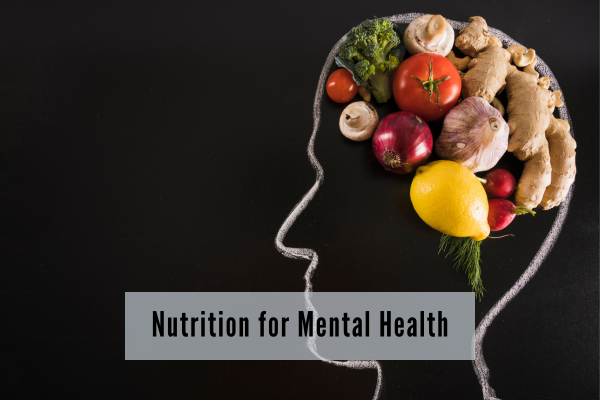The Role of Nutrition in Mental Health: Foods that Boost Your Mood, Nutrition plays a crucial role in maintaining not only physical health but also mental well-being. What we eat can significantly impact our mood, energy levels, and overall mental health. Understanding the connection between diet and mental health can help you make informed choices about the foods you consume. Here’s a guide on how nutrition affects mental health and which foods can boost your mood.

1. Understanding the Connection Between Nutrition and Mental Health
Why It Matters: The brain requires a constant supply of nutrients to function optimally. Poor nutrition can lead to mental health issues such as depression, anxiety, and mood swings.
Key Concepts:
- Neurotransmitter Production: Certain nutrients are essential for the production of neurotransmitters, which are chemicals that transmit signals in the brain. For example, serotonin, which influences mood, is synthesized from the amino acid tryptophan.
- Brain Structure and Function: Nutrients like omega-3 fatty acids are critical for maintaining the structure and function of brain cells. A deficiency in these nutrients can affect cognitive function and mood.
- Inflammation: Chronic inflammation is linked to mental health disorders. Diets high in processed foods and sugars can promote inflammation, while anti-inflammatory foods can help reduce it.
2. Key Nutrients for Mental Health
1. Omega-3 Fatty Acids
Why It Matters: Omega-3 fatty acids are essential for brain health. They have anti-inflammatory properties and are involved in neurotransmitter function.
Sources:
- Fatty fish (salmon, mackerel, sardines)
- Flaxseeds and chia seeds
- Walnuts
- Omega-3 fortified eggs
2. B Vitamins
Why It Matters: B vitamins, especially B6, B12, and folate, are vital for brain health and the production of neurotransmitters.
Sources:
- Whole grains (brown rice, oats, barley)
- Leafy greens (spinach, kale)
- Legumes (beans, lentils)
- Meat, poultry, and fish
- Dairy products and eggs
3. Antioxidants
Why It Matters: Antioxidants protect the brain from oxidative stress, which can damage brain cells and lead to mental decline.
Sources:
- Berries (blueberries, strawberries, raspberries)
- Dark chocolate
- Nuts and seeds
- Vegetables (broccoli, spinach, carrots)
4. Magnesium
Why It Matters: Magnesium is involved in numerous biochemical reactions in the brain and helps regulate neurotransmitter activity.
Sources:
- Leafy greens (spinach, Swiss chard)
- Nuts and seeds (almonds, pumpkin seeds)
- Whole grains (brown rice, quinoa)
- Legumes (black beans, chickpeas)
5. Probiotics
Why It Matters: Gut health is closely linked to mental health, often referred to as the gut-brain axis. Probiotics help maintain a healthy gut microbiome, which can influence mood and behavior.
Sources:
- Yogurt with live cultures
- Kefir
- Sauerkraut and kimchi
- Fermented foods (miso, tempeh)
3. Foods That Boost Your Mood
1. Fatty Fish
Why It Matters: Fatty fish like salmon and mackerel are rich in omega-3 fatty acids, which support brain health and reduce inflammation.
How to Include:
- Grill or bake salmon for dinner.
- Add mackerel to salads or sandwiches.
- Snack on smoked salmon with whole grain crackers.
2. Dark Chocolate
Why It Matters: Dark chocolate contains flavonoids, caffeine, and serotonin, all of which can enhance mood and cognitive function.
How to Include:
- Enjoy a small piece of dark chocolate as a treat.
- Add dark chocolate chips to your oatmeal or yogurt.
- Make a healthy hot chocolate with dark cocoa powder.
3. Berries
Why It Matters: Berries are high in antioxidants, which protect the brain from oxidative stress and improve cognitive function.
How to Include:
- Add berries to your morning cereal or smoothie.
- Enjoy a bowl of mixed berries as a snack.
- Use berries as a topping for yogurt or salads.
4. Nuts and Seeds
Why It Matters: Nuts and seeds are rich in omega-3 fatty acids, antioxidants, and magnesium, all of which support brain health.
How to Include:
- Snack on a handful of mixed nuts.
- Sprinkle seeds like flaxseeds or chia seeds on your meals.
- Use nut butters as a spread on whole grain toast.
5. Leafy Greens
Why It Matters: Leafy greens are high in vitamins, minerals, and antioxidants that support overall brain function.
How to Include:
- Add spinach or kale to your smoothies.
- Make a salad with a variety of leafy greens.
- Incorporate greens into soups, stews, and stir-fries.
4. Tips for a Brain-Healthy Diet
Why It Matters: Making consistent, healthy food choices can have a significant impact on your mental health over time.
How to Do It:
- Eat a Balanced Diet: Ensure your meals include a variety of nutrients by incorporating fruits, vegetables, whole grains, lean proteins, and healthy fats.
- Stay Hydrated: Drink plenty of water throughout the day. Dehydration can affect your mood and cognitive function.
- Limit Processed Foods: Reduce your intake of processed foods, sugary snacks, and beverages, as they can contribute to inflammation and mood swings.
- Moderate Caffeine and Alcohol: While moderate caffeine can boost mood and alertness, excessive amounts can lead to anxiety. Similarly, limit alcohol intake, as it can negatively impact mental health.
- Plan Your Meals: Plan and prepare meals in advance to ensure you have healthy options available, reducing the temptation to reach for unhealthy snacks.
Conclusion:
Nutrition plays a pivotal role in mental health, influencing everything from mood and energy levels to cognitive function and resilience to stress. By incorporating nutrient-rich foods such as fatty fish, dark chocolate, berries, nuts, seeds, and leafy greens into your diet, you can support brain health and enhance your mental well-being. Remember, a balanced diet combined with other healthy lifestyle practices, such as regular exercise and adequate sleep, can significantly improve your overall quality of life.
